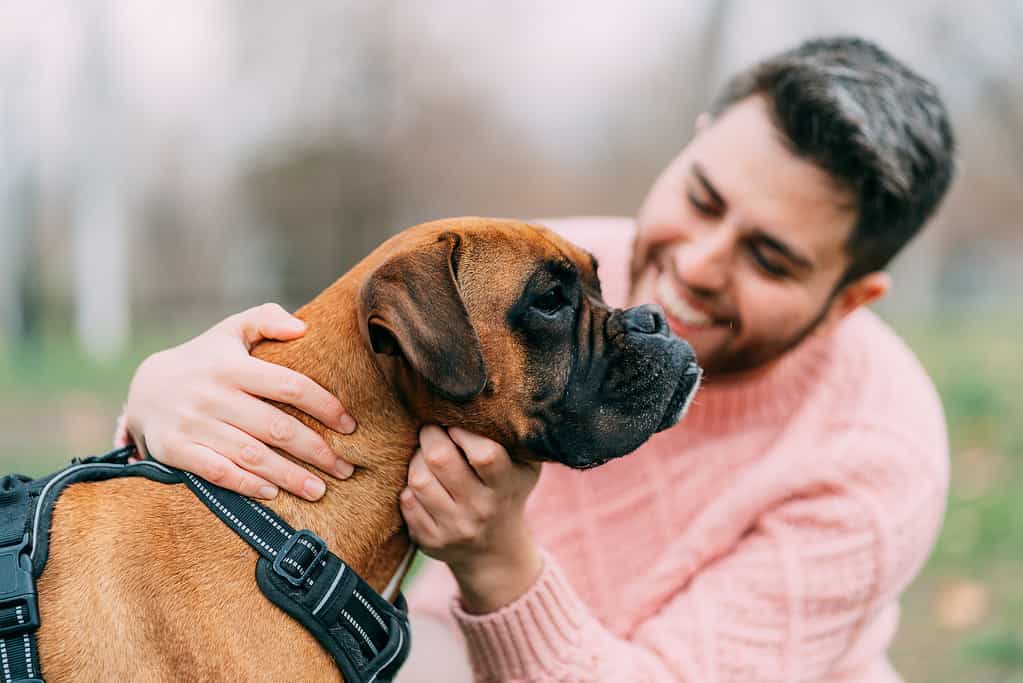Boxers are playful and loving creatures, making great family dogs. Though these pups might be a bit stubborn and easily distracted, they are also intelligent and athletic. With such high energy, however, Boxers are more difficult to train than some less lively dogs. Additionally, it’s crucial to start their training young, as this provides them with a better chance of retaining the information.
If you recently adopted a type of Boxer dog and would like to properly train it, here are some tips to try and mistakes to avoid in the process.
Tips for Training Your Boxer
Here are a few actionable tips to help you train your Boxer pup.

Boxers are smart and playful creatures.
©Gabor Kormany/Shutterstock.com
Train Them One on One
Boxers are social creatures that can easily get distracted by other dogs or animals. While you might be tempted to train multiple pups simultaneously, it can be difficult for them to pick up on your commands when they’re in a group setting. To reap the best results, train your Boxer one-on-one so it can more easily focus and retain information. This will set your pup up for success without overwhelming it.
However, make sure not to overexert Boxer pups until they mature, as their growth plates are not yet fully developed until 18 months.
Let Your Boxers Get Their Energy Out First
Boxers — especially puppies — are energetic dogs that require frequent exercise. If you want your Boxer pup to be able to focus on your commands and training, be sure to first let the dog release its energy through other forms of movement and activity. This might mean taking it for a walk, running around the backyard with it, or simply having some play time before you go into training mode. The less riled up your dog is, the more focused it will be.
Be Consistent
Consistency is key when training your Boxer pup. For example, if you’re trying to train your dog to heel when you walk it but then allow it to consistently tug on the leash without reprimanding it, it will get confused and assume its behavior is appropriate. To get the most out of your puppy training, be as consistent as possible with your rules and commands.
Additionally, if you are training your pup to do a cool trick (such as a “fist pump”), consistency is key here as well. Rehearse the trick as often as possible so your pup can fully catch on. The more practice, the better.
Have Patience
Boxer puppies are known for their stubborn nature. When training a Boxer, you must practice patience — even when it seems your pup isn’t listening. Training your Boxer might take some time, but don’t give up after a few tries. As mentioned above, consistency is key and requires patience. Eventually, your pup will start to pick up on your commands, as these dogs are intelligent creatures. Just because your dog might appear stubborn doesn’t mean it isn’t learning during your training sessions. Be patient with its progress.
Provide the Proper Rewards
Rewarding your pup is one of the most crucial parts of the training process. If you want your furry friend to pick up on a command, be ready to provide treats and other forms of praise to let it know it’s doing the right thing. Some treats include puppy snacks, belly rubs, or even just positive praise.
Common Mistakes When Training Your Boxer
Are you having trouble training your Boxer? Here are some common mistakes you’ll want to avoid.

Boxers can be sensitive to their owners’ emotions.
©iStock.com/Juan Hernandez Carmona
Using a Harsh Tone
You’ve likely heard the phrase, “It’s not what you say, it’s how you say it.” The same sentiment rings true when interacting with puppies, too. Especially with Boxers, who are sensitive dogs, you want to talk in a patient, calm, and cheerful tone so as not to cause anxiety or overwhelm. Even if the dog is ignoring a command or getting distracted, try not to lose your temper and raise your voice at the pup. This will only make the training more difficult for both of you.
Not Providing Rewards
If you aren’t providing sufficient rewards to your pup, it might not realize that it’s doing the right thing. By offering rewards like tasty treats, you are expressing your pride in their behavior and communicating that they’re fulfilling your commands.
However, failing to provide such rewards often leads to a disconnect during dog training. If you don’t have something of interest to offer your pup, it will likely get distracted by its surroundings. For instance, if you’re trying to train your dog in your backyard and it notices a squirrel, it might get sidetracked by the creature if you don’t have a more enticing reward to capture its attention. On the other hand, if you are waving a treat in front of your pup’s face, odds are it won’t be as tempted by the furry creature. Make sure your rewards are luring enough to keep your Boxer pup’s focus on you and your commands.
Training in Quiet Environments
While it might seem counterintuitive to train your puppy in a loud environment, not providing your pup with real-world training experience will lead to insufficient results. For instance, if you’re constantly teaching it commands or tricks in your own home and then take it out into a busy and distracted environment with no prior experience, the pup most likely won’t be as attentive. Real-world scenarios are what reinforce the training and elevate it to the next level.
Instead of only training in quiet locations, start in a secluded area and then slowly continue teaching your pup in more dynamic settings.
Giving Rewards at the Wrong Time
In addition to not providing enough or the right rewards, giving rewards at the wrong time can hinder your progress during puppy training. For instance, if your Boxer fails to respond correctly to a command and you still decide to give it a treat for its effort, you will ultimately confuse your pup by making it believe it did the right thing. While it might be tempting to gift your pup a participation trophy of sorts, this won’t be an effective training technique and can confuse your dog even more.
Command Nagging
Command nagging occurs when you repeat a command over and over even when your Boxer puppy is not listening to you. This teaches the Boxer that they don’t have to respond to your command on the first try. For example, if you continuously say “come” while your pup ignores you, you will teach it that it’s okay for it to take its time and not listen. Boxers are especially susceptible to command nagging.
Not Using Positive Emotions
While a harsh tone can be damaging to your pup during the training process, using a monotone voice is just as ineffective. When your dog fulfills your commands and displays the proper behavior in your training environment, you want to get excited and use a high-pitched voice to show your Boxer that you are proud of them and approve of their behavior. This acts as positive reinforcement and is just as important as other forms of rewards such as treats. Dogs can be in tune with humans’ emotions, so displaying your happiness will likely get a positive reaction from your dog.
Confusing Your Pup
Oftentimes, owners will confuse their pups by trying to teach them a ton of different tricks or commands at once. This can be overwhelming for your dog, making it difficult for them to retain the information (especially since Boxers are more energetic and easily distracted than other dogs). Not only that, but if you are inconsistent with your commands, such as being more lenient one day than the next, your dog will not know right from wrong. It’s important to be consistent and patient rather than rushing the process.
The photo featured at the top of this post is © iStock.com/:OLGA RYAZANTSEVA
Thank you for reading! Have some feedback for us? Contact the AZ Animals editorial team.







